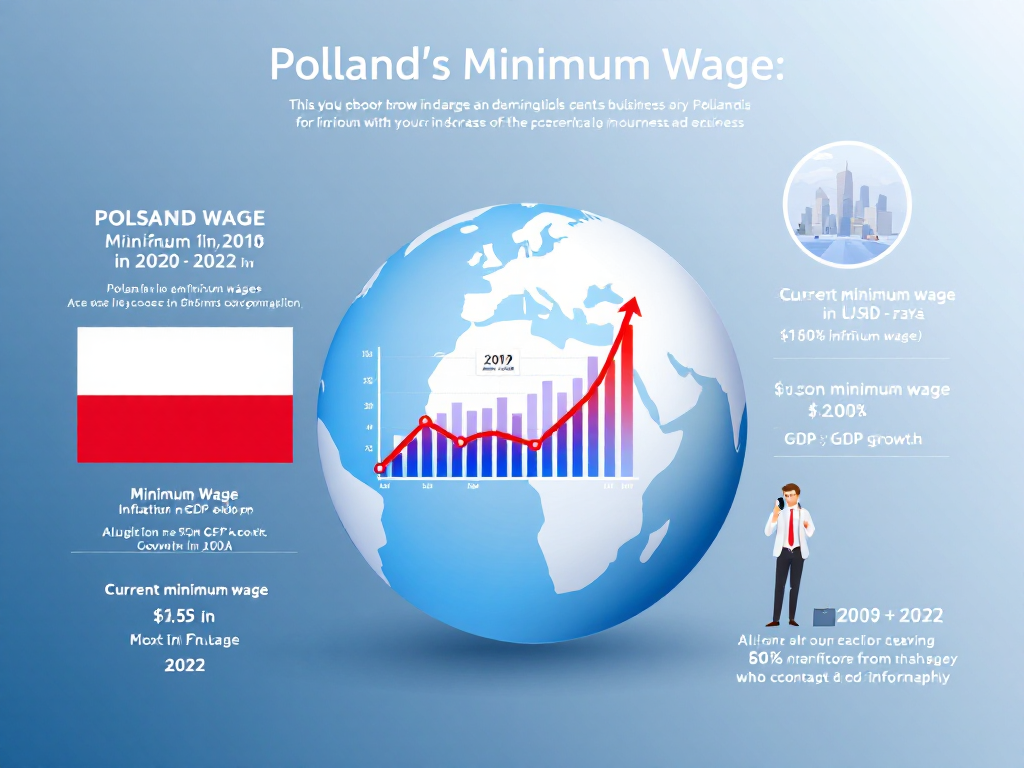Introduction: A Global Perspective
Imagine a rapidly expanding tech startup headquartered in California, managing a diverse team of developers scattered across Europe. As the company scales, it faces the intricate puzzle of international payroll, particularly when it comes to understanding and complying with various minimum wage laws. In this scenario, Poland’s minimum wage becomes a focal point, given the country’s burgeoning tech talent. Navigating these complexities requires more than just spreadsheets—it demands a streamlined system capable of handling cross-border transactions with precision. Enter PayInOne, a platform designed to simplify such challenges, enabling businesses to focus on growth rather than administrative hassles.
Understanding Poland’s Minimum Wage
Current Rates
As of 2023, Poland’s minimum wage stands at approximately 3,490 PLN per month. This rate is the result of continuous efforts by the Polish government to ensure a living wage for its workers, reflecting economic growth and inflation adjustments. For businesses, especially those operating internationally, understanding these rates is crucial for compliance and financial planning.
Conversion to USD
To grasp the impact of Poland’s minimum wage on global operations, it’s essential to convert this amount into US dollars. With exchange rates fluctuating, as of the latest data, 3,490 PLN translates to roughly 860 USD per month. This figure provides a tangible perspective for companies calculating payroll budgets across different currencies. The economic implications are significant, influencing not only budgeting but also strategic decisions regarding where to allocate resources and talent.
Significance for Global Teams
Market Trends
Poland has emerged as a hotspot for tech talent, drawing attention from global companies seeking skilled professionals at competitive costs. The country’s minimum wage plays a pivotal role in attracting foreign investment, as it offers a cost-effective alternative to higher wage markets without compromising on quality. Additionally, the surge in remote work has expanded the potential for hiring Polish talent, making it imperative for businesses to understand local wage standards.
Regulatory Developments
Recent regulatory changes have further underscored the importance of understanding Poland’s minimum wage. The Polish government has been proactive in aligning its labor laws with EU standards, impacting how international companies manage their workforce. These developments require businesses to stay informed and compliant, ensuring that their practices align with legal requirements to avoid potential penalties.
Challenges & Opportunities
Common Pain Points
Managing international payroll presents numerous challenges, such as currency fluctuations that can affect financial projections and budgeting. Additionally, compliance with local labor laws can be complex, especially when dealing with multiple jurisdictions. These issues are not only time-consuming but also pose significant risks if not handled correctly.
Potential Benefits
Despite these challenges, there are compelling opportunities for companies that navigate Poland’s minimum wage effectively. Cost savings are a primary benefit, as hiring in Poland can be more economical compared to other European countries. Moreover, access to a skilled talent pool enhances a company’s agility and ability to innovate. Sector-specific strategies, such as leveraging Poland’s strength in tech and engineering, can provide a competitive edge.
Expert Insights & Best Practices
Automation
To manage international payroll efficiently, automation is key. Leveraging technology to automate payments, tax calculations, and compliance checks can significantly reduce errors and free up resources. Platforms like PayInOne offer integrated solutions that streamline these processes, ensuring accuracy and compliance across borders.
Compliance Checklists
Developing comprehensive compliance checklists tailored to each country’s regulations can mitigate risks. These checklists should include updates on minimum wage changes, tax obligations, and labor laws. By systematically addressing these factors, businesses can maintain compliance and avoid costly penalties. Expert insights from industry leaders emphasize the importance of staying proactive and informed, a practice that PayInOne supports through its suite of compliance tools.
“What the Experts Say”: “Staying ahead of regulatory changes is crucial for companies operating internationally. Automation tools that keep track of compliance requirements are invaluable.” – Industry Leader
Case Studies: Real-World Implementation
Success Stories
Consider a multinational company in the tech sector that successfully navigated Poland’s wage regulations with the help of PayInOne. By implementing automated payroll systems, the company reduced administrative overhead by 30% and ensured timely, accurate payments to its Polish employees. This streamlined approach not only improved operational efficiency but also fostered a positive work environment, contributing to higher employee retention rates.
Lessons Learned
The key takeaway from such success stories is the importance of integrating technology with payroll processes. Companies that leverage platforms like PayInOne can achieve measurable outcomes, such as cost reductions and compliance adherence, which are critical for sustaining growth in a competitive global market.
Future Outlook
Emerging Trends
Looking ahead, Poland’s minimum wage is poised to evolve in response to economic conditions and labor market dynamics. Businesses must anticipate these changes and adapt their strategies accordingly. Technological advancements, such as blockchain and e-wallet solutions, are likely to reshape payroll systems, offering faster and more secure transactions.
Strategic Recommendations
To stay competitive, companies should invest in scalable payroll solutions that can adapt to regulatory changes and technological innovations. Embracing a forward-thinking approach will enable businesses to future-proof their operations and maintain an edge in cross-border transactions. Strategic advice includes diversifying talent acquisition strategies and continuously monitoring wage trends to make informed decisions.
Conclusion & Call to Action
In summary, understanding Poland’s minimum wage in USD is crucial for businesses operating internationally. It influences payroll, compliance, and strategic planning, impacting how companies manage their global teams. By leveraging platforms like PayInOne, businesses can simplify these processes, ensuring efficient and compliant operations.
Ready to simplify your global operations and tackle Poland’s minimum wage head-on? Discover how PayInOne can help by visiting https://payin.one/. Share your experiences or explore more resources to stay informed and competitive in the ever-evolving global market.

